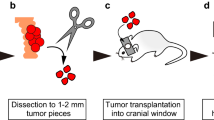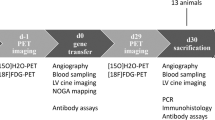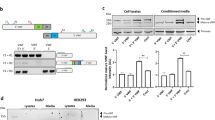Abstract
Gene therapy directed specifically to the vascular wall, particularly to angiogenic endothelial cells is a prerequisite in vascular disease treatment. Angiogenesis is a major feature in many pathological conditions including wound healing, solid tumors, developing metastases, ischemic heart diseases and diabetic retinopathy. In the present study we developed a tissue-specific gene therapy to the angiogenic blood vessels of tumor metastasis using an adeno-based vector containing the murine preproendothelin-1 (PPE-1) promoter. Genes activated by the PPE-1 promoter were highly expressed in bovine aortic endothelial cells in vitro. Systemic injection of the adenoviral vectors AdPPE-1-luciferase and AdCMV-luciferase to normal C57BL/6 mice, resulted in higher activity of PPE-1 promoter compared with CMV promoter in the aorta and vascularized tissues such as heart, kidney, lung and pancreas. Systemic administration of the adenoviral vector, in mice bearing Lewis lung carcinoma, resulted in high and specific activity of PPE-1 in the new vasculature of primary tumors and lung metastasis. Cellular distribution of the delivered gene revealed highest expression of GFP in angiogenic endothelial cells of the metastasis. We expect that this approach of ‘vascular-directed’ gene therapy will be applicable to both vascular diseases and cancer.
This is a preview of subscription content, access via your institution
Access options
Subscribe to this journal
Receive 12 print issues and online access
$259.00 per year
only $21.58 per issue
Buy this article
- Purchase on Springer Link
- Instant access to full article PDF
Prices may be subject to local taxes which are calculated during checkout







Similar content being viewed by others
References
Keshet E, Ben-Sasson SA . Anticancer drug targets: approaching angiogenesis J Clin Inv 1999 104: 1497–1501
Schulick AH et al. Endothelium-specific in vivo gene transfer Circ Res 1995 77: 475–485
Channon KM, George SE . Improved adenoviral vectors: cautious optimism for gene therapy Q J Med 1997 90: 105–109
Roth JA, Cristiano RJ . Gene therapy for cancer: what have we done and where are we going? J Nat Cancer Inst 1997 88: 21–39
Kaplan JM et al. Characterization of factors involved in modulating persistence of transgene expression from recombinant adenovirus in the mouse lung Hum Gene Ther 1997 8: 45–56
Worgall S, Wolff G, Falck-Pedersen E, Crystal RG . Innate immune mechanisms dominate elimination of adenoviral vectors following in vivo administration Hum Gene Ther 1997 8: 37–44
Yang Y et al. Cellular immunity to viral antigens limits E1-deleted adenoviruses for gene therapy Proc Natl Acad Sci USA 1994 91: 4407–4411
Nabel EG et al. Recombinant platelet-derived growth factor B gene expression in porcine arteries induces intimal hyperplasia in vivo J Clin Inv 1993 91: 1822–1829
Nabel EG et al. Recombinant fibroblast growth factor-1 promotes intimal hyperplasia and angiogenesis in arteries in vivo Nature 1993 362: 844–846
Nabel EG et al. Direct transfer of transforming growth factor β1 gene into arteries stimulates fibrocellular hyperplasia Proc Natl Acad Sci USA 1993 90: 10759–10763
Lemarchand P et al. Adenovirus-mediated transfer of recombinant human (1- antitrypsin cDNA to human endothelial cells Proc Natl Acad Sci USA 1992 89: 6482–6486
Lemarchand P, Jones M, Yamada I, Crystal RG . In vivo gene transfer and expression in normal uninjured blood vessels using replication-deficient recombinant adenovirus vectors Circ Res 1993 72: 1132–1138
Tanaka T, Cao Y, Folkman J, Fine HA . Viral vector-targeted antiangiogenic gene therapy utilizing an angiostatin complementary DNA Cancer Res 1998 58: 3362–3369
Ozaki K et al. Use of von Willebrand factor promoter to transduce suicidal gene to human endothelial cells, HUVEC Hum Gene Ther 1996 7: 1483–1490
Cowan PJ et al. Targeting gene expression to endothelial cells in transgenic mice using the human intercellular adhesion molecule 2 promoter Transplantation 1996 62: 155–160
Korhonen J et al. Endothelial-specific gene expression directed by the tie gene promoter in vivo Blood 1995 86: 1828–1835
Jaggar RT, Chan HY, Harris A, Bicknell R . Endothelial cell-specific expression of tumor necrosis factor alpha from KDR or E-selectin promoters following retroviral delivery Hum Gene Ther 1997 8: 2239–2247
Harats D et al. Targeting gene expression to the vascular wall in transgenic mice using the murine preproendothelin-1 promoter J Clin Inv 1995 95: 1335–1344
Bu X, Quertermous T . Idenification of endothelin-1 cell specific regulatory region in the murine endothelin-1 gene J Biol Chem 1997 272: 32613–32622
McMillen MA, Sumpio BF . Endothelins: polyfunctional cytokines J Am Coll Surg 1995 180: 621–637
Rubanyi GM, Polokoff MA . Endothelins: molecular biology, biochemistry, pharmacology, physiology, and patophysiology Pharmacol Rev 1994 46: 325–402
Hu J, Discher DJ, Bishopric NH, Webster KA . Hypoxia regulates expression of the endothelin-1 gene through a proximal hypoxia-inducible factor-1 binding site on the antisense strand Biochem Biophys Res Comm 1998 245: 894–899
Matsuura A et al. Vascular endothelial growth factor increases endothelin converting enzyme expression in vascular endothelial cells Biochem Biophys Res comm 1997 235: 713–716
Matsuura A et al. Stimulatory interaction between vascular endothelial growth factor and endothelin-1 on each gene expression Hypertension 1998 32: 89–95
Salani D et al. Endothelin-1 induces an angiogenic phenotype in cultured endothelial cells and stimulates neovascularization Am J Pathol 2000 157: 1703–1711
Bagnato A et al. Autocrine actions of endothelin-1 as growth factor in human ovarian carcinoma cells Clin Canc Res 1995 1: 1059–1066
Bagnato A, Tecce R, Di Castro V, Catt KJ . Activation of mitogenic signaling by endothelin 1 in ovarian carcinoma cells Cancer Res 1997 57: 1306–1311
O'Reilly MS et al. Angiostatin: a novel angiogenesis inhibitor that mediates the suppression of metastases by a Lewis lung carcinoma Cell 1994 79: 315–328
Jäger U, Zhao Y, Porter CD . Endothelial cell-specific transcriptional targeting from a hybrid long terminal repeat retrovirus vector containing human prepro-endothelin-1 promoter sequences J Virol 1999 73: 9702–9709
Fechner H et al. Expression of coxsackie adenovirus receptor and alpha v-integrin does not correlate with adenovector targeting in vivo indicating anatomical vector barriers Gene Therapy 1999 6: 1520–1535
Brooks PC, Clark RAF, Cheresh DA . Requirement of vascular integrin αvβ3 for angiogenesis Science 1994 264: 569–571
Cheresh DA . Death to a blood vessel, death to a tumor Nat Med 1998 4: 395–396
Shenk T . Adenoviridae: the viruses and their replication. In: Fields BN, Knipe DM, Howley PM et al (eds) Fields Virology Raven Publishers: Philadelphia 1996 2111–2148
Yang Z, Krasnici N, Luscher TF . Endothelin-1 potentiates human smooth muscle cell growth to PDGF: effect of ETA and ETB receptor blockade Circulation 1999 100: 5–8
Liefeldt L et al. Transcriptional regulation of endothelin-1 by erythropoietin in endothelial cells J Cardiovasc Pharmacol 1998 31 (Suppl. 1): S464–S466
Folkman J . Antiangiogenic gene therapy Proc Natl Acad Sci USA 1998 95: 9064–9066
Holmgren L, O'Reilly MS, Folkman J . Dormancy of micrometastases: balanced proliferation and apoptosis in the presence of angiogenesis suppression Nat Med 1995 1: 149–153
Boehm T, Folkman J, Browder T, O'Reilly MS . Antiangiogenic therapy of experimental cancer does not induce acquired drug resistance Nature 1997 390: 404–407
Lin P et al. Antiangiogenic gene therapy targeting the endothelium-specific receptor tyrosine kinase Tie2 Proc Natl Acad Sci USA 1998 95: 8829–8834
Becker TC et al. Use of recombinant adenovirus for metabolic engineering of mammalian cells. In: Roth M (ed) Methods in Cell Biology Academic Press: New York 1994 161–189
Seijffers R et al. Increase in PDX-1 levels suppresses insulin gene expression in RIN 1046–38 cells Endocrinology 1999 140: 3311–3317
Ellis LM et al. Down-regulation of vascular endothelial growth factor in a human colon carcinoma cell line transfected with an antisense expression vector specific for c-src J Biol Chem 1998 273: 1052–1057
Acknowledgements
We thank Dr J Roitelman for his scientific assistance. This research was supported by the Ministry of Science and Art Fund grant No. 6735195; Israel Cancer Association through the estate of the late Yvon Heymann; Recanati Foundation, Tel-Aviv University grant No. 01370902.
Author information
Authors and Affiliations
Rights and permissions
About this article
Cite this article
Varda-Bloom, N., Shaish, A., Gonen, A. et al. Tissue-specific gene therapy directed to tumor angiogenesis. Gene Ther 8, 819–827 (2001). https://doi.org/10.1038/sj.gt.3301472
Received:
Accepted:
Published:
Issue Date:
DOI: https://doi.org/10.1038/sj.gt.3301472
Keywords
This article is cited by
-
Effects of oncolytic viruses and viral vectors on immunity in glioblastoma
Gene Therapy (2022)
-
Liver to Pancreas Transdifferentiation
Current Diabetes Reports (2019)
-
Regulation of the hypoxic tumor environment in hepatocellular carcinoma using RNA interference
Cancer Cell International (2017)
-
VB-111: a novel anti-vascular therapeutic for glioblastoma multiforme
Journal of Neuro-Oncology (2015)
-
Reduction of experimental diabetic vascular leakage and pericyte apoptosis in mice by delivery of αA-crystallin with a recombinant adenovirus
Diabetologia (2012)



